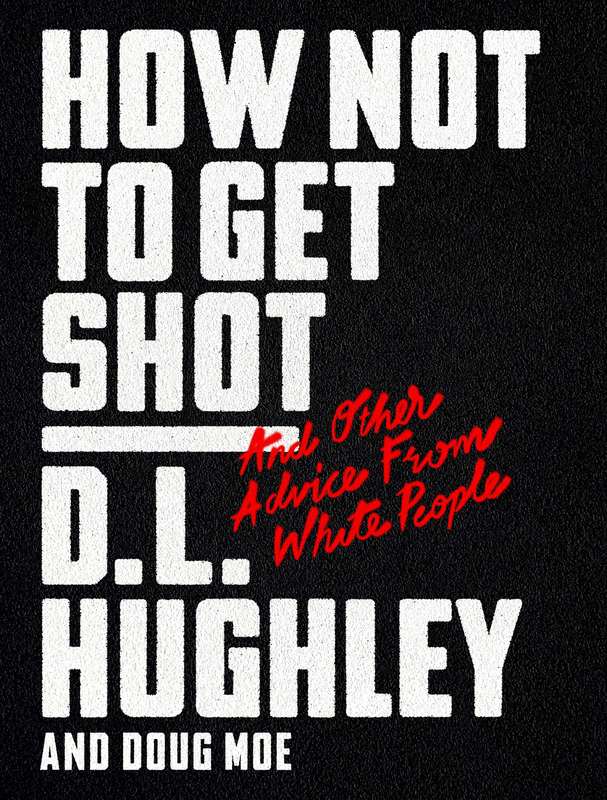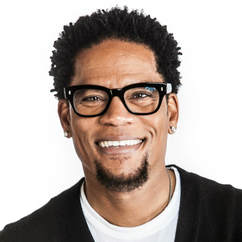HOW TO NOT GET SHOT
And Other Advice From White People
And Other Advice From White People
By D.L. Hughley and Doug Moe
Contrarian: noun; a person who opposes or rejects popular opinion; going against current practice
Sounds like D.L. Hughley to me.
Actor, author, radio host, a legendary stand-up comedian, and of course one of the “Original Kings of Comedy”, D.L. Hughley has written a book to save the lives of black people, specifically black men. Why? Because black and brown men are still getting unjustifiable murdered and the law continues to fail to hold their killers accountable. America’s refusal to systemically address police brutality has caused an immense amount of literary responses to the issue, mostly by academics, you want to use logic to convey to white America why their actions, or lack thereof, is both harmful and problematic to the identity of America. Hughley uses a different approach. Dripping with sarcasm and frustration, D.L. Hughley has presented the world with a best-selling f*ck you, also known as, How To Not Get Shot: And Other Advice From White People.
Sounds like D.L. Hughley to me.
Actor, author, radio host, a legendary stand-up comedian, and of course one of the “Original Kings of Comedy”, D.L. Hughley has written a book to save the lives of black people, specifically black men. Why? Because black and brown men are still getting unjustifiable murdered and the law continues to fail to hold their killers accountable. America’s refusal to systemically address police brutality has caused an immense amount of literary responses to the issue, mostly by academics, you want to use logic to convey to white America why their actions, or lack thereof, is both harmful and problematic to the identity of America. Hughley uses a different approach. Dripping with sarcasm and frustration, D.L. Hughley has presented the world with a best-selling f*ck you, also known as, How To Not Get Shot: And Other Advice From White People.
|
In collaboration with author and columnist Doug Moe, Hughley uses every piece of advice he has heard a White person give to a Black person regarding police brutality and provides examples of why that advice is bullsh*t. He describes it as “the etiquette guide that black people didn’t know they needed until White America doubled down on White Power” (pg. 5). This isn’t the first book to address police brutality and it won’t be the last, but the D.L. Hughley has found his own way to express his discontent: sarcasm. This book uses a combination of facts, experience, and wit to convey just how ineffective that advice is because he knows, and deep down so do you, that the best chance one has to not get unjustifiably shot by a police officer is to not be Black. That’s not to say that non-Black people never get shot by cops, but their chances of survival are much greater.
This book would not be my first pick to give to someone who does not believe race is an issue because that person needs an academic stupidity-proof breakdown of race relations in America. Once that person is able to acknowledge that race is an issue in this country, is when you introduce them to a book like this. For every ‘helpful’ suggestion they give about how to be Black in America, this book offers up an example and retort showcasing that no matter how educated, well-mannered, or ‘put-together’ one is the mere existence of their blackness will be used against them. D.L. Hughley’s frustration isn’t lost in the sarcastic tone of the book, but don’t tell that to those who actually need to read this book. You wouldn’t want to risk alienation by showing them the thoughts of a Black man who has emotions other than joy and gratitude. Don’t believe me? Wait, until “Part IV” of the book where D.L. Hughley provides a breakdown on how to be acceptable in the eyes of White America. This book isn’t without its flaws. I couldn’t help but notice that the book is dedicated to Hughley’s son and leaves out his two daughters. While this was clearly a personal decision and solely his to make, it made me question the lack of presence of Black women throughout the book. How To Not Get Shot mostly focuses on interactions between Black men and police officers, which plays into the archetype that Black women are invisible. In 260 pages there are a few sporadic mentioning of Black women. There is an acknowledgment of Sandra Bland getting murdered for speaking too ‘aggresively’ towards a police officer, that black hair is too ‘different’, and a critique for those who attack Black single-parent households, but there is much more to the black female existence especially in relation to police brutality. There’s a missed opportunity for there to be at least a chapter dedicated to black women, mothers, sisters, friends, and daughters who have died at the hands of police brutality or a retort to those who criticize Black women for acting as leaders in the movement to end police brutality, i.e. the creators of the Black Lives Matter movement: Alicia Garza, Patrisse Cullors, and Opal Tometi, or the treatment of U.S. Representative Maxine Waters after she stood up to President 45. (If anyone is seeking more information on black women in the movement to end police brutality I would recommend Invisible No More: Police Violence Against Black Women and Women of Color by Andrea J. Ritchie). Nevertheless, How To Not Get Shot: And Other Advice From White People provides necessary observations that allow conversations of police brutality to move forward rather than remaining stagnant. So, what’s next for D.L. Hughley? It is unlikely that this will be his last book since over the past few years he has become an active political commentator, taking on the likes of Megan Kelly on Fox News and holding his own on Larry King and The View. In addition to his political commentary, you can listen to his nationally syndicated radio show, The D.L. Hughley Show, or watch his comedy special on Netflix, Contrarian. How To Not Get Shot: And Other Advice From White People is published by William Morrow. |



